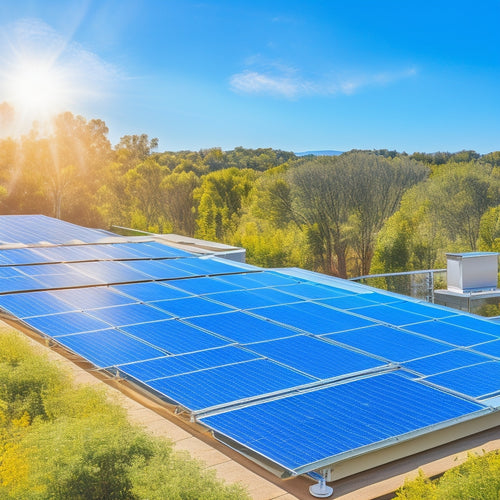
What Are Solar Energy Storage System Costs?
Share
You can expect to pay between $8,000 and $15,000 upfront for a solar energy storage system, with additional costs for installation, permits, and inspections that can add $2,000 to $5,000 to the total bill. Battery costs vary, ranging from $5,000 to $15,000, and inverter prices range from $0.10 to $0.30 per watt. Charging and maintenance costs will also factor into the overall cost, including replacement parts, labor, and potential downtime. To get a clear understanding of the total cost of ownership, you'll want to evaluate all these components and factors to accurately budget for your solar energy storage system.
Overview
- Solar energy storage system costs range from $8,000 to $15,000, including installation, permits, and inspections.
- Battery costs vary from $5,000 to $15,000, depending on type, quality, and lifespan, with lithium-ion being pricier.
- Inverter prices range from $0.10 to $0.30 per watt, with reliable options and warranties crucial for successful installations.
- Maintenance costs include replacement parts, labor, and potential downtime, with regular checks recommended every 6-12 months.
- Government incentives, financing options, and comprehensive cost analysis can help reduce and spread costs over time, making solar energy storage more accessible.
Understanding Solar Energy Storage
Several key factors contribute to the growing popularity of solar energy storage systems, and understanding their underlying mechanics is essential for utilizing their full potential.
You'll find that advancements in solar technology have notably improved energy efficiency, making it more viable for widespread adoption. Renewable incentives have also driven growth, as governments worldwide offer subsidies to encourage the shift to cleaner energy.
For instance, Battery Types such as deep cycle batteries and lithium-ion batteries have become increasingly popular for their reliability and high energy density. Additionally, the cost-effectiveness of flow batteries for long-duration energy storage has made them a viable option.
When it comes to grid integration, solar energy storage systems must be capable of adapting to fluctuating demand and supply. This is where battery chemistry plays a vital role, as it directly affects system scalability.
As you investigate the market trends, you'll see that the environmental impact of solar energy storage is a considerable selling point, leading to increased adoption and reduced carbon emissions.
Battery Costs and Lifespan
As you consider the viability of solar energy storage systems, you're likely to focus on the financial aspects, which ultimately come down to battery costs and lifespan.
The cost of batteries varies depending on the type, with lead-acid batteries being the most affordable and lithium-ion batteries being more expensive. On average, solar batteries range from $5,000 to $15,000 or more, influenced by battery type and quality.
The lifespan of a battery is also an essential factor, as it affects the overall cost of ownership. Lifespan factors include the number of charge cycles, depth of discharge, and operating temperature.
Understanding these factors is vital in determining the total cost of ownership and ensuring a reliable solar energy storage system. By considering these variables, you can make an informed decision about the best battery option for your needs.
Inverter and Installation Fees
Beyond battery costs, you'll need to factor in the expenses associated with inverters and installation fees to get a thorough understanding of your solar energy storage system's total cost.
Inverters, which convert DC power to AC, come in different types, such as string inverters, microinverters, and power optimizers. Each type has its own price point, ranging from $0.10 to $0.30 per watt.
When selecting an inverter, consider the importance of reliable inverters and extensive warranties for successful DIY installations. The structural soundness of your roof and regular maintenance are also essential for a successful installation.
The installation process also varies in complexity and cost, depending on factors like system size, roof type, and local labor rates. On average, installation fees can add $2,000 to $5,000 to your overall cost.
Charging and Maintenance Costs
Most solar energy storage systems require periodic charging and maintenance to guarantee peak performance and longevity.
You'll need to take into account the charging efficiency of your system, as it affects how quickly you can recharge your batteries. Typically, charging efficiency ranges from 90% to 95%, depending on the system's design and quality.
Maintenance frequency is another vital aspect, as regular checks can prevent issues and extend the system's lifespan. You'll need to factor in the cost of replacement parts, labor, and potential downtime when calculating your maintenance costs.
Be prepared to perform routine checks every 6-12 months, with more extensive maintenance every 2-5 years.
Total System Cost Breakdown
Now that you've factored in the charging and maintenance costs, it's time to calculate the total system cost breakdown.
This includes the upfront cost of the solar energy storage system, which typically ranges from $8,000 to $15,000.
You'll also need to take into account the cost of installation, permits, and inspections, which can add up to $2,000 to $5,000.
Fortunately, you may be eligible for government incentives, such as the Solar Investment Tax Credit, which can reduce your total cost by up to 30%.
Additionally, you can investigate financing options, like loans or power purchase agreements, to spread the cost over time.
Frequently Asked Questions
Can I Use a Single Battery for My Solar Energy Storage System?
You can use a single battery for your solar energy storage system, but consider the battery capacity and system efficiency to guarantee ideal performance, as undersizing can lead to reduced power output and lifespan.
Are Solar Energy Storage Systems Eligible for Federal Tax Credits?
Like a ray of sunshine, federal incentives brighten your solar energy storage system's outlook! You'll be eligible for tax benefits, with the Solar Investment Tax Credit (ITC) providing a 26% credit on qualified expenditures, giving you more freedom to capture the sun's power.
Can I Charge My Electric Vehicle From My Solar Energy Storage System?
You can charge your electric vehicle from your solar energy storage system, but it depends on the system's charging efficiency and battery capacity, ensuring you have sufficient power to meet your vehicle's charging needs.
How Does Solar Energy Storage Affect My Homeowners Insurance?
You'll likely need to notify your insurer about your solar energy storage system, as it may impact your policy; investigate if your provider requires policy adjustments, and expect changes to your insurance coverage, potentially affecting your premiums.
Can I Add More Batteries to My System in the Future?
You can easily expand your solar energy storage capacity in the future by adding more batteries, a process known as battery expansion, allowing you to upgrade your system as your energy needs evolve, securing your independence.
Ready to Buy
As you weigh the benefits of a solar energy storage system, the cost is likely top of mind. On one hand, the upfront investment may seem intimidating, with battery prices ranging from $5,000 to $15,000 or more, depending on capacity and brand. On the other hand, long-term savings from reduced grid reliance and extended system lifespan could add up to tens of thousands of dollars. The key is to strike a balance between initial cost and future benefits, making solar energy storage a smart investment for those who plan ahead.
Related Posts
-

What Types of Solar Energy Devices Are Available
You'll find several types of solar energy devices available today, each customized to different energy needs. Photovo...
-

Solar Powered Lights for Sustainable Home Decor
Solar-powered lights offer a stylish and eco-friendly way to enhance your home decor. They capture sunlight, converti...
-

Top Off Grid Solar Batteries for Renewable Energy
When seeking top off-grid solar batteries for renewable energy, consider options with advanced battery chemistry, suc...


